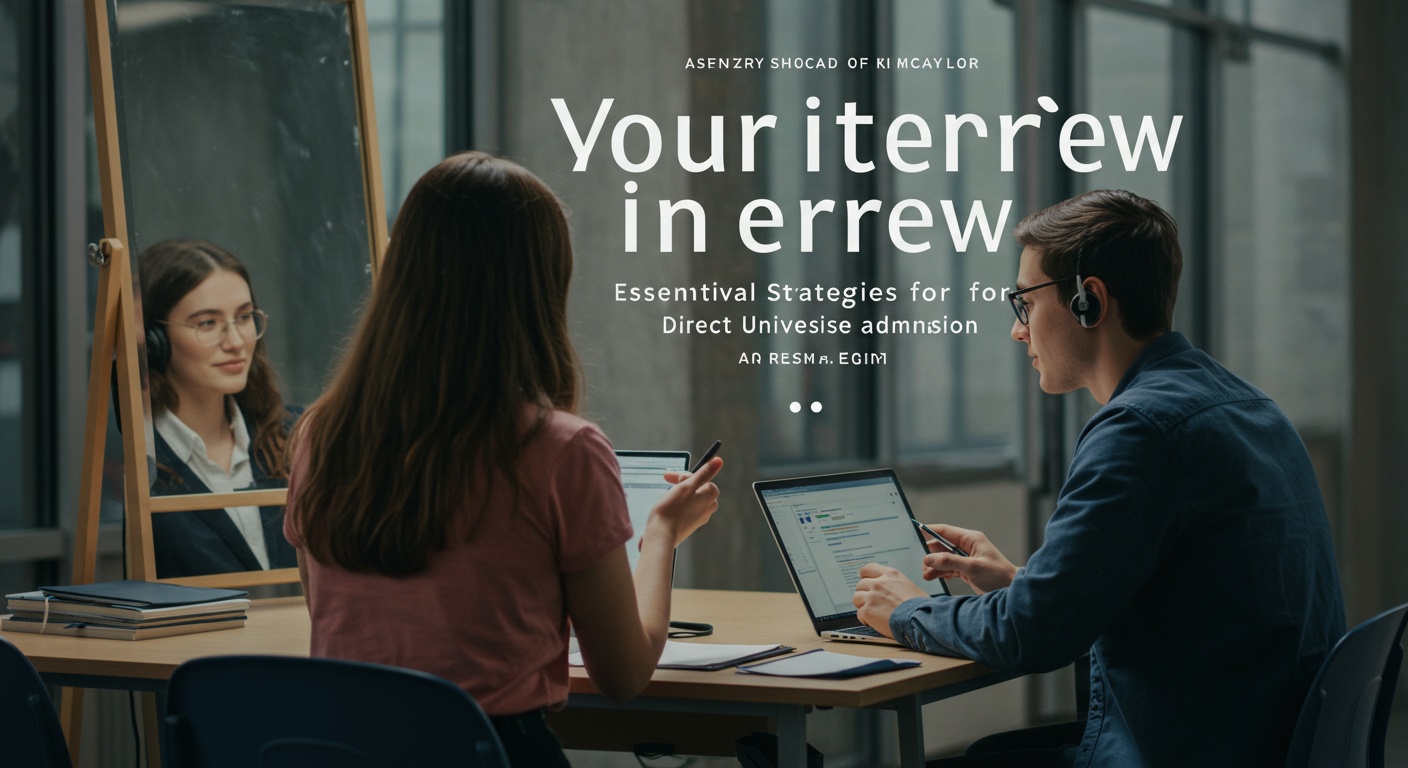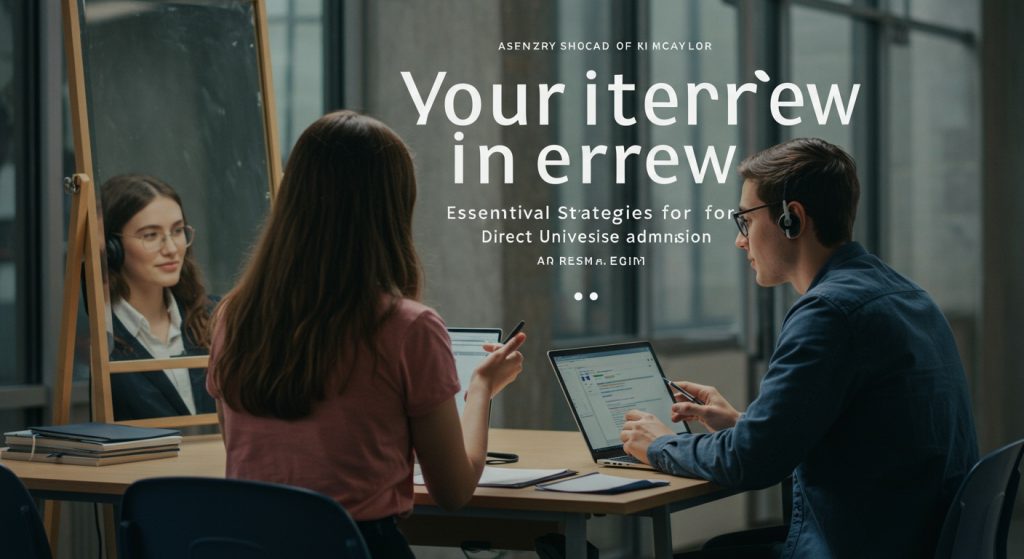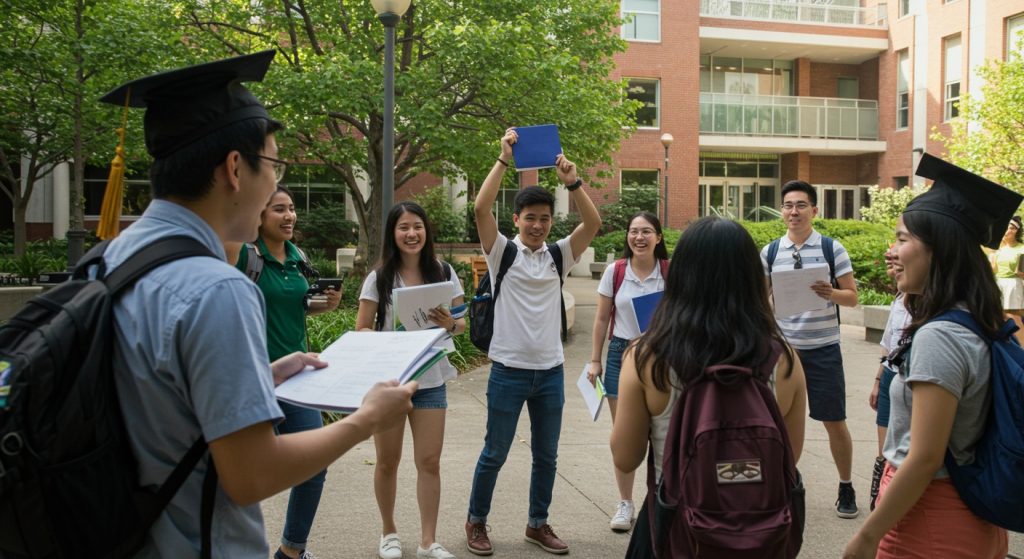Navigating direct university admissions today demands more than stellar grades; it requires mastering the interview, a critical hurdle in a post-pandemic landscape increasingly emphasizing holistic applicant reviews. Prospective students now face virtual interview formats, challenging them to convey authentic personality and analytical prowess remotely. Universities seek evidence of genuine intellectual curiosity, problem-solving capabilities. Alignment with evolving academic priorities, such as interdisciplinary collaboration or ethical considerations in emerging fields like AI. Demonstrating these competencies, rather than merely reciting achievements, becomes paramount. Strategic preparation transforms a high-stakes conversation into an opportunity to showcase unique potential, proving a valuable fit for advanced academic environments.

Understanding the Direct University Admission Landscape
- Direct University Admission
- “Holistic Review,”
For many highly sought-after fields—medicine, law, specialized engineering programs, or arts conservatories—interviews are almost standard. They serve as a vital filter, helping admissions officers discern passion, critical thinking, communication skills. Resilience from a pool of academically strong candidates. Essentially, while your grades get you to the interview room, your performance in the interview determines if you secure one of those coveted Direct Admission Options. It’s your chance to demonstrate who you are beyond your transcript.
Deconstructing Interview Types for University Admissions
University interviews aren’t a one-size-fits-all affair. Understanding the different formats can significantly help you prepare and adapt your strategy. Each type tests slightly different skills and presents unique dynamics.
- One-on-One Interviews
- Panel Interviews
- Multiple Mini Interviews (MMI)
- Group Interviews
This is perhaps the most common format. You’ll typically meet with a single interviewer, who could be an admissions officer, a faculty member, or an alumnus. The conversation tends to be more personal, allowing for deeper exploration of your interests, experiences. Aspirations. The key here is to build rapport and engage in a genuine dialogue.
In this setup, you’ll face two or more interviewers simultaneously. This format is common for highly competitive programs, allowing multiple perspectives on your responses. It demands strong eye contact across the panel, the ability to address different individuals. A focused approach to answering questions while managing multiple listeners.
Often used for healthcare programs (like medicine, dentistry, nursing), MMIs are a series of short, structured interview stations. You’ll move from one station to another, engaging with different scenarios or interviewers for a few minutes at each. These stations might involve ethical dilemmas, role-playing, problem-solving, or traditional Q&A. The MMI format assesses a broad range of non-cognitive skills, such as empathy, communication, critical thinking. Ethical reasoning, under time pressure.
Less common for direct university admission. Sometimes used, particularly for programs emphasizing teamwork or leadership. In a group interview, you’ll interact with other applicants while being observed by interviewers. This format assesses how you collaborate, communicate within a group, listen to others. Assert your ideas respectfully.
Here’s a quick comparison of the primary interview types:
| Interview Type | Format | Key Skills Assessed | Preparation Focus |
|---|---|---|---|
| One-on-One | Single interviewer, conversational | Personal connection, depth of thought, genuine interest | Self-reflection, tailored responses, rapport building |
| Panel Interview | Multiple interviewers, structured questions | Composure, addressing multiple listeners, coherent answers | Maintaining eye contact, clear articulation, managing pressure |
| Multiple Mini Interview (MMI) | Series of short, distinct stations | Ethical reasoning, problem-solving, empathy, communication under pressure | Practicing diverse scenarios, time management, quick thinking |
| Group Interview | Interacting with other applicants, observed by interviewers | Teamwork, leadership, active listening, respectful communication | Contribution without dominating, collaborative problem-solving |
Strategic Pre-Interview Preparation: Laying Your Foundation
Success in any interview, especially one for Direct University Admission Options, hinges on thorough preparation. This isn’t just about memorizing answers; it’s about understanding yourself, the university. How you fit into their vision.
- Researching the University and Program
- Understanding the Interviewers (if possible)
- Anticipating Common Questions
- Behavioral Questions
- Situational Questions
- Motivational Questions
- Crafting Your Narrative and Key Messages
- Practicing with Mock Interviews
Go beyond the website homepage. Delve into the specific program’s curriculum, faculty research interests, unique facilities, student clubs. Campus culture. Comprehend the university’s mission and values. How do your aspirations align with theirs? For example, if a university emphasizes community engagement, be ready to discuss your volunteer experiences.
While not always feasible, if you know who your interviewers will be (e. G. , specific faculty members), research their professional backgrounds and academic interests. This can help you tailor your responses or ask more informed questions. Even if you don’t know names, understanding typical interviewer roles (admissions, faculty, alumni) helps.
University interviews often feature a mix of question types:
These ask about past experiences to predict future behavior. Examples: “Tell me about a time you faced a challenge and how you overcame it.” “Describe a situation where you worked in a team.”
These present hypothetical scenarios. Examples: “What would you do if you disagreed with a professor’s viewpoint?” “How would you handle a heavy course load?”
These delve into your reasons for applying. Examples: “Why this university?” “Why this specific program?” “What are your career aspirations?”
Before the interview, identify 3-5 key messages you want to convey about yourself—your strengths, passions, unique experiences. Why you’re a perfect fit. Think about how your experiences, even seemingly unrelated ones, can demonstrate skills relevant to university success (e. G. , leadership from organizing a school event, problem-solving from a science fair project).
This is perhaps the most crucial step. Ask a teacher, counselor, parent, or mentor to conduct mock interviews. Request honest feedback on your content, delivery, body language. Clarity. Record yourself if possible to identify areas for improvement. Practice articulating your responses clearly and concisely, rather than rambling.
Mastering the Interview Day: Execution Excellence
The day of the interview is when all your preparation culminates. How you present yourself and interact with the interviewer(s) is just as essential as the content of your answers.
- Dress Code and Professionalism
- Non-Verbal Cues: Body Language and Eye Contact
- Active Listening and Thoughtful Responses
- The STAR Method Explained
- S – Situation
- T – Task
- A – Action
- R – Result
- Example
Aim for business casual or professional attire. This shows respect for the institution and the opportunity. Ensure your clothes are clean, pressed. Comfortable. For online interviews, pay attention to your background, lighting. Sound quality.
Your non-verbal communication speaks volumes. Maintain good eye contact (or look at the camera for virtual interviews). Sit upright, lean slightly forward to show engagement. Use appropriate hand gestures. Avoid fidgeting, slouching, or crossing your arms defensively. A confident, open posture conveys enthusiasm and self-assurance.
Listen carefully to each question. It’s perfectly fine to pause briefly to collect your thoughts before answering. Avoid interrupting. Your answers should be thoughtful, specific. Demonstrate self-awareness. Connect your experiences back to the skills or qualities the university values.
For behavioral questions, the STAR method is an invaluable tool for structuring your responses effectively.
Briefly describe the context or background of the situation.
Explain the specific task or challenge you faced.
Detail the actions you took to address the task or challenge. Focus on “I” statements.
Describe the outcome of your actions and what you learned from the experience. Quantify results where possible.
“Tell me about a time you showed leadership.”
S: During my final year of high school, our debate club faced a significant challenge. Our president left unexpectedly. We had a major regional competition approaching with no clear leader. T: I felt it was my responsibility to step up and coordinate the team, ensuring we were prepared and motivated despite the setback. A: I organized daily practice sessions, delegated research tasks based on individual strengths. Facilitated strategy discussions. I also took the initiative to mentor newer members, helping them refine their arguments and presentation skills. R: As a result, not only did we successfully compete. We also achieved our best performance in five years, placing second overall. This experience taught me the importance of proactive leadership and effective delegation under pressure. At the end of the interview, you will almost certainly be given the opportunity to ask questions. This is not a formality; it’s another chance to show your genuine interest and engagement. Ask questions that demonstrate your research and thoughtful consideration. Avoid questions whose answers are easily found on the website. Instead, ask about specific research opportunities, student support services, unique courses, or the interviewer’s own experience with the university. For example: “Could you tell me more about the interdisciplinary research opportunities available within the Department of [Your Major]?” or “What are some of the most common challenges students face in this program. How does the university support them?”
Handling Challenging Scenarios and Unexpected Questions
Even with the best preparation, you might encounter questions that throw you off balance. Your ability to handle these moments with grace and composure is itself a test.
- “Tell me about a time you failed.” This is a common behavioral question designed to assess self-awareness, resilience. Your ability to learn from mistakes. Frame your answer using the STAR method: describe the failure, your role in it, what actions you took to rectify it or mitigate its impact. Most importantly, what valuable lesson you learned from it. Focus on growth, not just the setback.
- “Why this university/program?” (Deep Dive)
- Dealing with Nerves or a Difficult Interviewer
- What to do if you don’t know an answer
This isn’t just about superficial reasons. Admissions officers want to see genuine intellectual curiosity and a well-thought-out rationale. Connect your specific academic interests, career goals. Personal values to the unique aspects of their program, faculty. Resources. Mention specific courses, professors, research labs, or student organizations that excite you.
It’s normal to be nervous. Take a deep breath. If you feel overwhelmed, it’s okay to say, “That’s an interesting question, could I take a moment to think about that?” If an interviewer seems disengaged, maintain your composure and focus on delivering your best answers. Don’t let their demeanor rattle you.
Honesty is the best policy. Instead of bluffing, admit you don’t know but offer a thoughtful approach to finding the answer. For example, “That’s a great question. I don’t have a definitive answer right now. But, if faced with that situation, I would approach it by [describe problem-solving steps]…” This demonstrates critical thinking even in the absence of direct knowledge.
The Post-Interview Follow-Up: Leaving a Lasting Impression
Your interaction with the university doesn’t end when you walk out of the interview room or click “end meeting.” A thoughtful follow-up can reinforce your positive impression.
- Sending a Thank-You Note
- Reflecting on Your Performance
- Maintaining Professionalism
Always send a thank-you note or email within 24 hours of your interview. It should be concise, professional. Personalized. Thank the interviewer for their time, reiterate your enthusiasm for the program and university. Briefly mention something specific you discussed to remind them of your conversation. This shows professionalism and genuine interest.
Take some time to reflect on how you felt the interview went. What went well? What could you have improved? This self-assessment is valuable for future interviews, even if you secure one of your preferred Direct Admission Options.
Regardless of the outcome, maintain a respectful and professional demeanor in all your communications with the university. Admissions processes can be long. Your interactions contribute to your overall profile.
Conclusion
As you prepare to ace your university admission interview, remember it’s more than just answering questions; it’s about showcasing your authentic self and genuine fit. Universities, particularly in today’s holistic admissions landscape, seek students who embody their values and will actively contribute to their community, not just academically. My personal tip? Don’t merely recite accomplishments; instead, narrate the story behind them. For instance, I’ve seen students truly shine when they illustrate how volunteering at a local tech hub fueled their passion for computer science, directly linking it to a specific program or professor’s groundbreaking research at their institution. Be proactive: research recent faculty publications, current campus initiatives, or even their latest virtual event series to formulate truly insightful questions. This demonstrates genuine engagement – a key differentiator in a competitive applicant pool. Remember, the goal isn’t perfection. Connection. Embrace your unique journey, articulate your “why,” and confidently present the vibrant future you envision within their academic environment. Your preparedness, combined with your authentic voice, will undoubtedly pave your path to success.
More Articles
Career Focused: Choosing the Right State University for Your Future Goals
Ace Your Application: State University Requirements You Must Know for 2025
Find Your Path: How to Choose a College Major That Fits You
Mastering College: Effective Time Management Strategies for Academic Success
Exam Success: Proven Strategies for Preparing for State University Entrance Exams
FAQs
So, what’s ‘Ace Your Interview’ all about?
This guide is your ultimate playbook for nailing university admission interviews, especially if you’re going for direct entry. It covers everything you need to know, from initial prep to leaving a lasting positive impression.
Will these strategies work for any university?
Absolutely! While the title mentions ‘direct admission,’ the core strategies are super versatile. Whether you’re targeting a local college or an international institution, these tips are designed to boost your confidence and performance across the board.
What kinds of essential strategies are covered?
We dig deep into key areas like thorough university and course research, understanding typical interview questions, effective practice techniques, refining your communication skills. Even last-minute tips for interview day itself.
How crucial is the interview for direct university admission?
It’s incredibly crucial! For direct admission, the interview is often the final, most personal hurdle. It’s your chance to show who you really are beyond just your grades and essays, making it a potential game-changer for your application.
I always get super nervous before interviews. Any help for that?
Definitely! We’ve got dedicated sections focused on managing those butterflies, building genuine confidence. Practical techniques to help you stay calm and focused so you can truly shine.
Do I need to memorize answers for every single question they might ask?
Not at all! The goal isn’t to parrot memorized scripts. Instead, we guide you on understanding common question themes and what interviewers are actually looking for. It’s about having a solid framework and being able to think on your feet.
What’s one common mistake students make during these interviews?
A big one is not showing genuine excitement or failing to clearly connect their own experiences and future goals to the specific university and program. Sometimes, a lack of detailed research or sounding rehearsed rather than authentic can also really hurt.



